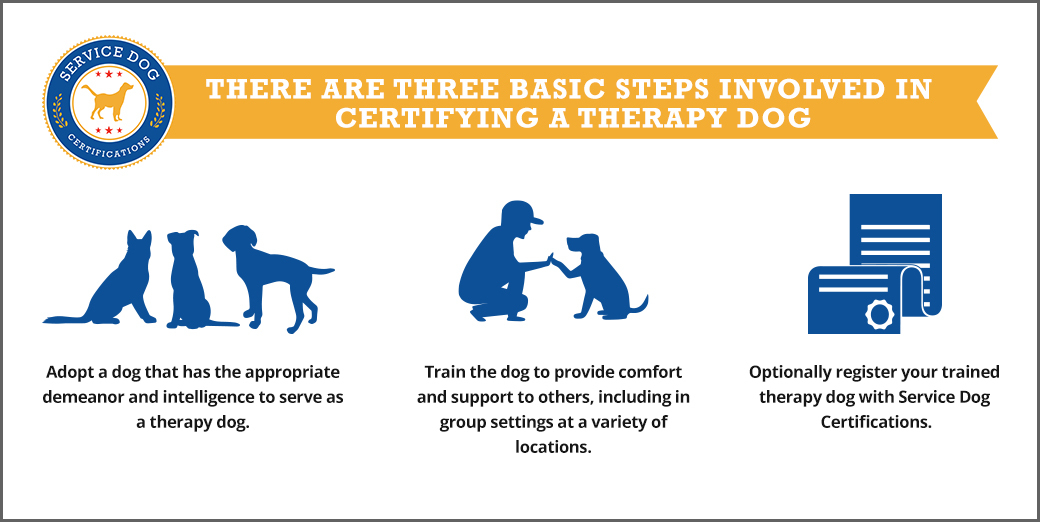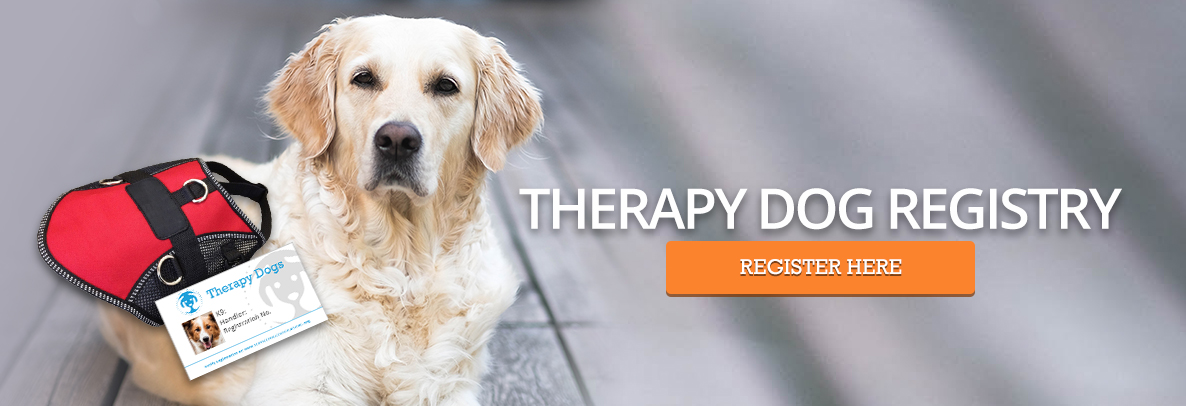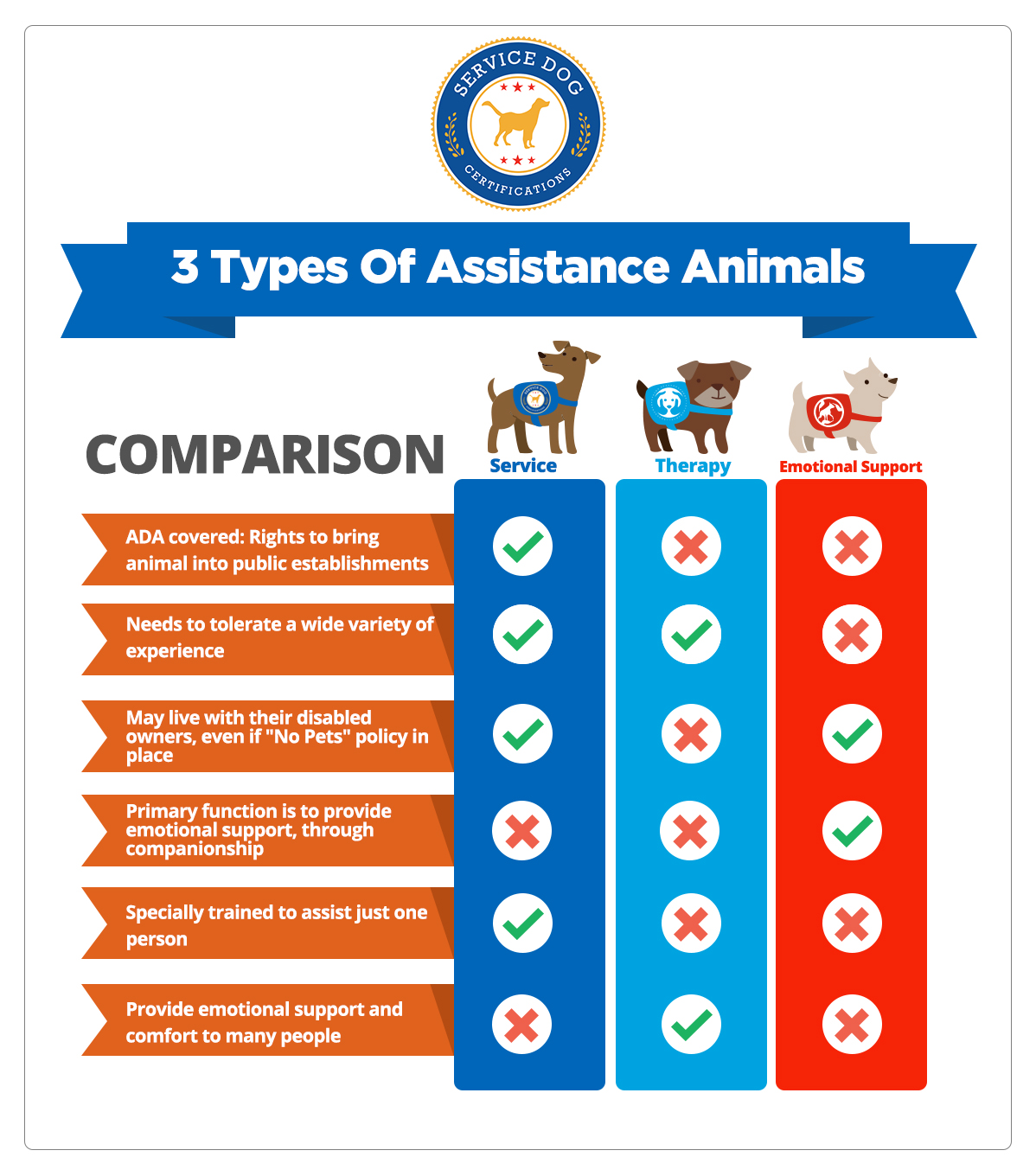How to Certify a Therapy Dog

Therapy dogs are a source of love and affection in our lives and those of our friends and family. They provide a welcome distraction for students during stressful exam periods, give affection and companionship to seniors, and bring comfort to patients recovering from illnesses in hospitals. Therapy dogs can provide people of all ages with unconditional love, a furry hug, and some much-needed stress relief.
Table of contents
What is a therapy dog?
Definition: A therapy dog is a dog that has undergone training to provide comfort and support to people, often in group settings.
Therapy vs. Emotional Support Dogs: Therapy dogs provide help to people other than their owners, while service dogs and emotional support dogs directly assist their owners with a physical or mental health condition. Therapy dogs can frequently be found working in environments such as schools, retirement homes, hospitals, workplaces, disaster sites, nursing homes, and hospices.
There are three basic steps involved in certifying a therapy dog:
- Adopt a dog with the appropriate demeanor and intelligence to serve as a therapy dog.
- Train the dog to provide comfort and support to others, including in group settings at various locations.
- Optionally register your trained therapy dog with an organization, such as Service Dog Certifications.

Up next: In this article, we’ll explore how a regular dog can become a therapy dog. We will also explain the key differences between a therapy dog and a service dog or emotional support dog, especially regarding the rights of their handlers.
Types of therapy animals
Different animals: Therapy animals are commonly dogs, but they can be any type of domesticated animal that has been trained to provide comfort and support to individuals and groups that are experiencing distress. These animals can provide this service just through their presence – animals are known to have a calming effect on people – but can also be trained to perform tasks. For example, a therapy dog can be trained to lie down to be petted, perform tricks to provide a welcome distraction, or apply comforting paw pressure to someone struggling with anxiety.
Breeds of dog: Any breed of dog can qualify as a therapy dog as long as they have the proper temperament and intelligence. A good therapy dog should have the ability to be around groups of people and remain calm and dedicated to their tasks – they must be able to remain focused even if the individuals around are in distress. Proper socialization for a therapy dog is key because they will come into contact with many strangers and possibly other animals.
Work environments: Therapy dogs often work in various environments, some of which can be chaotic such as a school, hospital, or disaster area. A therapy dog handler has to be able to ensure that their dog will remain alert, calm, and responsive to their commands in any situation. Therapy dogs must also handle surprises, as small children and people suffering from mental health issues may act erratically. Due to the potentially stressful nature of such work environments, it is also important that a therapy dog handler ensures that the dog is not overworked or stressed and is given plenty of breaks and periods of rest.
Even though dogs are traditionally the most commonly used animal in the therapy world, other species can also perform this important work. These include:
- Cats – Although they may not be as “transportable” as canines, some nursing homes have made cats a permanent part of their elderly care regimen. A resident feline at a nursing home can weave in and out of the patient’s rooms and, if the mood strikes, may even choose to stay for a snooze or a snuggle. A daily visit from a cat can brighten even the darkest of days.
- Equine – Horses help individuals dealing with issues like drug abuse, learning disabilities, or rehabilitation. Teaching a person how to trust and interact with a creature, such as a horse, can have invaluable benefits.
- Small animals – Guinea pigs and rabbits are also being used for therapy work. These small furry animals are easy to manage and can be of great comfort, especially for individuals who may fear dogs or cats.

Do I need an emotional support dog or a therapy dog?
The main difference: Therapy dogs provide comfort intermittently, but if you are in need of your own comfort animal at all times, an emotional support animal (ESA) is more appropriate.
ESA rights: ESAs are a recognized type of assistance animal under the Federal Housing Act in addition to various state laws; they are permitted to accompany their owners in residences (even if the building bans pets) free of charge.
ESA types: Emotional support animals are commonly dogs and cats, but they can be any type of small, domesticated animal. ESAs do not require special training – they provide comfort and support for mental health conditions just through companionship.
How to qualify: To qualify for an emotional support animal, you need a letter of recommendation from a licensed healthcare professional. The licensed professional will determine whether you have a condition that qualifies for an ESA and whether such support would help with the condition. Emotional support animals are used for various mental health issues such as depression, anxiety, PTSD, and phobias.
If you have an ESA letter, you can submit it to your landlord for the accommodation of your emotional support animal. Read more on how to get an emotional support animal letter.
What is the difference between a service dog and a therapy dog?
What “service” means: Service dogs assist only their handlers with their disabilities, while therapy dogs are expected to interact with people other than their caretakers and provide them with therapeutic support. Service dog owners generally do not want members of the public interfering with their dogs while they are on duty.
Service dogs have special rights under the Americans with Disabilities Act (ADA) and are allowed to go to public areas such as grocery stores, restaurants, libraries, entertainment venues, and hotels. A service dog is trained to perform specific tasks to assist its owner with a disability. For example, a service dog can be its owner’s eyes or ears, pick up dropped items, retrieve medications, hail emergency services, and even alert the handler to a drop in blood sugar or an oncoming seizure.
Service dogs help a disabled individual live with a level of independence that otherwise might not be possible. Service dogs have the right to accompany their owners in public venues, housing, and flights, but therapy dogs do not have that same right.
On the other hand, Therapy dogs are not considered service dogs under the ADA. A therapy dog is intended to work for others and must be invited to places such as schools and hospitals to work with the individuals there. You can learn more about service dog laws here.
How do I register my therapy dog?
If you’re interested in adopting a therapy dog and providing services for individuals and organizations, the most critical step is properly training your dog. As previously discussed, a therapy dog must be thoroughly trained to calmly and confidently deal with strangers in various potentially busy environments.
How do I prove for sure that my dog is a therapy dog? There is no universal standard for the qualification of a therapy dog. Various organizations provide training courses and certification programs. Many therapy dog owners choose to train their dogs by themselves. If you’re interested in working as a therapy dog handler, you must understand what type of experience and qualifications the organizations and individuals you hope to work with are seeking.
Registration: Registering your therapy dog or obtaining an identification card is entirely optional. Many therapy dog handlers, however, obtain ID cards and register their animal in a database to allow a smooth job experience. For example, having an ID card or vest helps therapy dog handlers signal that they are at a location to work and the therapy dog is on the premises as an invited guest to provide therapeutic support.
Similar to service dog handlers using accessories such as ID badges, certificates, and vests to help signal to members of the public that their animals are on duty, therapy dog owners also use these items to help identify themselves and their dogs as part of a pet therapy team.
Do I need a special letter for my therapy dog?
Unlike an emotional support animal, you do not need a letter of recommendation for a therapy dog. It is up to the organization or individual you work for to determine whether they want to hire you and your therapy dog. A therapy dog works on location as an invited guest of the facility; presenting a letter or certification may not be necessary when showing up for work.
Dogs are gifted with a multitude of abilities
Whether your dog is a therapy dog, an emotional support animal, or a service canine, the work these animals do is vital in the lives of many. Each type of assistance animal has different legal rights and qualification procedures, so it’s critical to understand their differences. But no matter what type of assistance animal they are, these dogs help people live their lives with unconditional love, freedom, and independence.

About the Author: The writing team at Service Dog Certifications is made up of folks who really know their stuff when it comes to disability laws and assistance animals. Many of our writers and editors have service dogs themselves and share insights from their own experiences. All of us have a passion for disability rights and animals.
18 comments
Leave a Reply Cancel reply
Latest Posts

Can you bring a service dog to a museum?
Yes, you can bring your service dog to the museum! All the major U.S. museums welcome guests with service animals in accordance with the Americans with Disabilities Act (ADA). There are some areas, however, that might be off-limits. Here’s what you should know if you plan to spend a day at the museum with your […]

Read More

How to Bring a Service Dog to Six Flags Magic Mountain
Service dogs are welcome at Six Flags Magic Mountain so long as they are, according to Six Flags, “trained to do work or perform tasks for people with disabilities.” Of course, your dog must be housebroken and remain on a leash or harness and under your control while at the park — and the park […]

Read More

When Stores Can Refuse Your Service Dog
According to the Americans with Disabilities Act (ADA), service dogs should be allowed into any store most of the time. A store owner can legally exclude a service dog if they are actively growling, snapping at, or frightening customers, or if the dog is obviously out of the control of its owner. Ordinary behaviors — […]

Read More


My St Bernard he’s 3 has pAst all his training. From Beginning to His advance classes. He also has passed Therapy Class through PetSmart in Louisville, Kentucky. How do I go about getting him certified so I can take him into nursing homes, hospitals ect to do visits?
I’m looking to get my miniature horse registered for a therapy animal for hospitals nursing homes ect
how do i go about getting my yorkie to be a emotional support dog for myself and children? What do i need to do?
You would need to talk to a doctor or therapist. They will help you assess your situation and see if you have an emotional or mental disorder that qualifies you to have an ESA. If they agree, they will issue an ESA Letter for you, and you’ll be legally allowed to own an ESA.
My St Bernard is 6 months old and has been in hospitals and nursing homes more times than I can count since I got him at 6 weeks old. I”d like to get him certified as a Therapy dog, he clearly is a Therapy dog, but it sounds like you have to jump through hoops back from the beginning for the AKC registration. Is there a simpler way? I mean, I just want him to get the acknowledgement for all of the joy that he brings!
So a therapy dog that visits hospitals, nursing homes, schools and libraries has less status and less rights than a emotional support animal that has less training this makes no sense at all and is prejudiced.
This info was so helpful, thank you! ❤
I am diabetic, my dog let’s me know if my blood is low, how do I register her as a service dog.
Training your dog to help you manage your disability is the main requirement of turning your dog into a service dog. Your dog already seems to know what to do, which is awesome! Registrations per se are not required by the ADA, however many service dog owners find the registration and issued ID help when bringing your service dog to public places. You may find this article on how to register your service dog interesting https://www.servicedogcertifications.org/how-to-register-your-dog-as-a-service-dog/
Hi Nicholas. Who did you go through to register your dog as a service dog.
I have a Shitzhu that is so loving and caring. She loves everyone and I think that she could be so beneficial to bring into a retirement home or assisted living facility. She would, without a doubt, put many smiles on residents faces! She is beyond special and does not have an aggressive bone in her body.
I just finished classes at petsmart for my German shepherd as a therapy dog. How do I register her?
Registering a therapy dog is not required, but if you would like to do so please see this link: https://www.servicedogcertifications.org/therapy-animal-id/
Can you help me register my Labrador as a therapy dog. I run a therapeutic centre for autistic children and they love animals. I have brought her in for a visit and the calmness with the kids has been amazing.
Therapy dogs do not have to be registered, but we offer Therapy Dog accessories for owners of trained and qualified therapy dogs: https://www.servicedogcertifications.org/therapy-animal-id/
What if i dont have a therapy dog yet ? How do i adopt a dog bring it home and start the process ? Can the landlord charge money for dog while going through the process. ?
Can a psychiatrist fill out form for the need of a therapy dog ?
thank you,
Dennis
It seems like you may be referring to an emotional support animal. You would need a letter from a licensed healthcare professional. Please see this link for more information: https://www.servicedogcertifications.org/how-to-get-an-emotional-support-dog-letter/
My dog is so calm amongst all sizes of dogs
He has supported me through difficult times and has given strength to people in various places
Everyone comes to him for a hug and he never refuses does this sound good to register